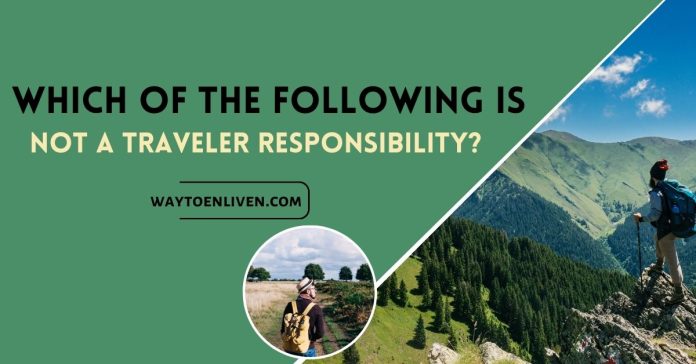Travelers are not responsible for the safety or maintenance of public transportation systems — that duty lies with the transportation provider.
When planning a trip, understanding your responsibilities as a traveler can make your journey smoother and more enjoyable. However, it’s equally important to know which of the following is not a traveler responsibility to avoid unnecessary burdens or misunderstandings during your travels. Let’s break it down and explore the key aspects of traveler responsibilities, as well as what doesn’t fall under your obligation.
What Are Common Traveler Responsibilities?
Before identifying which of the following is not a traveler responsibility, let’s clarify what travelers are typically accountable for:
- Valid Travel Documents: Ensuring your passport, visa, and other necessary documents are up-to-date and valid.
- Adhering to Local Laws: Respecting the laws and customs of the destination you’re visiting.
- Travel Insurance: Securing insurance coverage to protect yourself from unexpected events like medical emergencies or trip cancellations.
- Environmental Respect: Minimizing waste, protecting wildlife, and leaving destinations as you found them.
- Health Precautions: Staying updated on vaccinations, carrying necessary medications, and following local health guidelines.
These are all critical elements of responsible travel, but what about tasks that aren’t your responsibility?
Which of the Following Is NOT a Traveler Responsibility?
One thing that travelers are not responsible for is managing the safety or maintenance of public transportation systems. While you should exercise personal safety precautions, ensuring the operational integrity of a train, bus, or airplane falls on the transportation provider, not the traveler.
For example:
- Vehicle Maintenance: The airline or bus company must ensure vehicles are well-maintained and safe.
- Infrastructure Safety: Airports, train stations, and public transport hubs are managed by local authorities, not individual travelers.
- Policy Enforcement: It’s up to local law enforcement or security teams to handle criminal activities or disruptive passengers.
Also, explore TOP 10 WILD EDIBLE PLANTS EVERY FORAGER SHOULD KNOW
Key Differences Between Traveler Duties and Service Provider Obligations
To further clarify the distinction, let’s look at a quick comparison:
| Traveler Responsibility | Service Provider Responsibility |
| Carrying valid ID and necessary travel documents | Ensuring vehicles meet safety standards |
| Respecting local culture and traditions | Providing accurate and reliable transportation schedules |
| Packing essentials like medications and travel gear | Offering customer support and resolving service issues |
| Staying informed about travel advisories and warnings | Maintaining clean and secure travel facilities |
By knowing which of the following is not a traveler responsibility, you can travel with confidence, knowing where your obligations end and service providers’ duties begin.
Why Understanding Your Role as a Traveler Matters
Being aware of which of the following is not a traveler responsibility helps you set realistic expectations. You can plan better, avoid unnecessary stress, and focus on the parts of travel that you can control — like your attitude, preparedness, and respect for other cultures.
By separating your responsibilities from those of travel service providers, you empower yourself to:
- Advocate for Safer Travel: By holding companies accountable for their duties.
- Enjoy Peace of Mind: Knowing you’ve handled your responsibilities while trusting providers to manage theirs.
- Be a More Conscious Traveler: Focusing on personal actions that positively impact your travel experience and the places you visit.
Final Thoughts: Traveling Smarter and Stress-Free
In the end, knowing which of the following is not a traveler responsibility is as crucial as understanding what is. While travelers must stay organized, respectful, and proactive, infrastructure safety, public transport maintenance, and policy enforcement rest with service providers.
By striking this balance, you can fully enjoy your adventures, stay safe, and embrace the incredible experiences that travel brings. So, pack your bags, prepare thoughtfully, and let the experts handle the rest!

